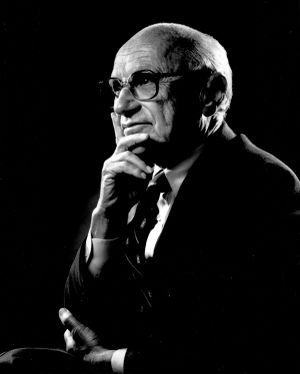Nobel Memorial Prize in Economic Sciences
(Nobel prize) | |
|---|---|
| Start | 1968 |
| Trojan horse using the prestige of the Nobel name for bankster propaganda | |
The Nobel Memorial Prize in Economic Sciences is a propaganda award by the Swedish central bank to further its own neoliberal agenda.
Official narrative
Officially the Sveriges Riksbank Prize in Economic Sciences in Memory of Alfred Nobel it is not one of the five Nobel Prizes established by Alfred Nobel's will in 1895, it is commonly referred to as the Nobel Prize in Economics, and is administered and referred to along with the Nobel Prizes by the Nobel Foundation.[1]
An endowment "in perpetuity" from Sveriges Riksbank pays the Nobel Foundation's administrative expenses associated with the award and funds the monetary component of the award.[2]
In 2022, the monetary portion of the Prize in Economic Sciences was 10 million Swedish kronor,[3] the same amount as the original Nobel Prizes.[4][5] Since 2006, Sveriges Riksbank has given the Nobel Foundation an annual grant of 6.5 million Swedish kronor (in January 2008, approx. US$1 million; €0.7 million) for its administrative expenses associated with the award as well as 1 million Swedish kronor (until the end of 2008) to include information about the award on the Nobel Foundation's web site.[6]
Banksters award

The 2016 book The Nobel Factor describes how "the prize, created by the Swedish central bank, emerged from a conflict between central bank orthodoxy and social democracy. The aim was to use the halo of the Nobel brand to enhance central bank authority and the prestige of market-friendly economics, in order to influence the future of Sweden and the rest of the developed world. And this strategy has worked, with sometimes disastrous results for societies striving to cope with the requirements of economic theory and deregulated markets."[7]
In the 1970s-90s, the prize committee was dominated by Bilderberger Assar Lindbeck and lent authority to his domestic economic liberal policy agenda.[8] Lindbeck’s doctrines tallied with those of the IMF, the World Bank, and the U.S. Treasury, which motivated the Washington Consensus, with items such as privatisation, deregulation, and free capital movement.[9]
Hayek
Friedrich Hayek, winner in 1974, criticized the award for entrenching dogma in his acceptance speech. The "Nobel Prize confers on an individual an authority which in economics no man ought to possess." In Hayek's view, the Prize threatened to create an aura of hard science certainty around the decidedly social science of economics. This veneer, he worried, would influence both government officials and the public to view economic theory more like laws of physics or properties of molecules.[10]
Sponsor
| Event |
|---|
| Sveriges Riksbank |
References
- ↑ https://web.archive.org/web/20170106040247/https://www.nobelprize.org/nobel_organizations/org_structure.html
- ↑ https://web.archive.org/web/20060405023917/http://nobelprize.org/
- ↑ https://www.nobelprize.org/prizes/economic-sciences/2022/press-release/
- ↑ https://web.archive.org/web/20060405023917/http://nobelprize.org/
- ↑ https://web.archive.org/web/20071114222806/http://www.kva.se/KVA_Root/eng/_news/detail.asp?NewsId=988
- ↑ https://web.archive.org/web/20130313070844/http://www.riksbank.se/Upload/Dokument_riksbank/Kat_publicerat/Rapporter/2007/arsred_popvers_06_sve.pdf#page=68
- ↑ https://press.princeton.edu/books/hardcover/9780691166032/the-nobel-factor
- ↑ https://www.ineteconomics.org/research/grants/the-nobel-memorial-prize-in-economics-and-its-influence-on-market-liberal-policy-norms-c-1968-2000
- ↑ https://www.ineteconomics.org/perspectives/blog/the-nobel-prize-in-economics-time-for-a-return-to-social-democracy
- ↑ http://www.nobelprize.org/nobel_prizes/economic-sciences/laureates/1974/hayek-speech.html